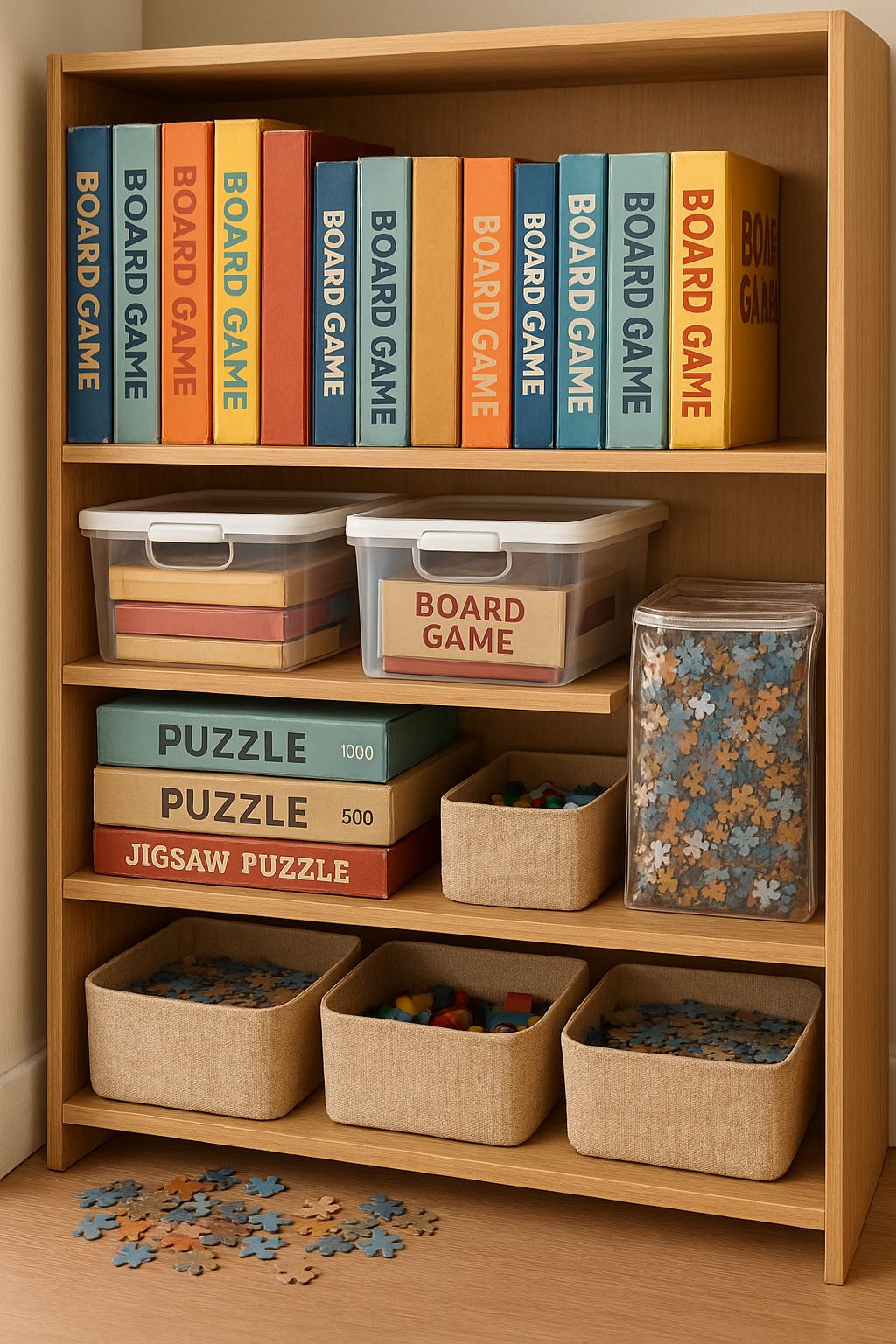Board games and puzzles are a source of fun, connection, and mental challenge for families and friends. Whether you enjoy competitive strategy games, party games, or quiet evenings assembling a puzzle, these activities can bring people together in meaningful ways. However, as collections grow, so does the challenge of storing them.
Boxes can be bulky, puzzle pieces get lost, and stacks of games can easily become disorganized. Without a system, your favorite pastimes might end up tucked away and forgotten—or worse, damaged beyond use.
With the right strategies, you can keep your board games and puzzles organized, protected, and ready to play at a moment’s notice.
Understanding the Storage Challenges
Before deciding how to store your collection, it’s important to understand the challenges:
- Varied sizes and shapes: Game boxes are rarely uniform, which makes stacking tricky.
- Fragile contents: Cardboard boxes can warp or tear over time.
- Loose pieces: Missing cards, dice, or puzzle pieces can render a game unplayable.
- Limited space: Collections can quickly outgrow available shelves or closets.
Identifying your specific pain points will help you choose the most effective storage methods.
Decluttering Your Collection
Start by going through your games and puzzles:
- Donate or sell games you no longer play.
- Recycle incomplete puzzles or games missing critical pieces.
- Keep only those you truly enjoy and will use.
This step frees up space and ensures that your storage efforts focus on items worth keeping.
Choosing the Right Storage Location
Where you store your collection depends on how often you use it:
- Living room shelves: Ideal for games you play frequently.
- Closet or cabinet: Works for less-used items but still offers protection.
- Under-bed storage: Great for seasonal or rarely played games in small homes.
Avoid damp basements or hot attics, as extreme temperatures and humidity can damage boxes and components.
Shelf Storage for Easy Access
Sturdy bookshelves or cube shelving units are excellent for displaying and storing board games:
- Store games vertically like books to make them easy to pull out without unstacking others.
- Use adjustable shelves to accommodate different box heights.
- Keep heavier games on lower shelves for safety.
Cube storage systems also allow you to use bins or baskets for loose puzzles or game components.
Clear Storage Bins for Protection
For games you want to keep in top condition, clear plastic bins with secure lids offer excellent protection:
- Choose bins just big enough to hold the game to avoid wasted space.
- Use one bin per game or group smaller games together.
- Label bins clearly with the game name and number of pieces.
Clear bins make it easy to see what’s inside while keeping dust and moisture out.
Puzzle Storage Solutions
Puzzles require special consideration since they often come in flimsy boxes and contain hundreds—or thousands—of small pieces.
- Puzzle mats: Roll up an unfinished puzzle without losing progress.
- Flat storage drawers: Store completed puzzles for display or ongoing projects.
- Plastic zipper pouches: Replace damaged boxes with labeled pouches that take up less space.
For families that do puzzles frequently, keeping a dedicated puzzle table can make storage and setup easier.
Organizing Game Components
Even when boxes are intact, small pieces can shift and get lost. Keep components organized with:
- Small zip-top bags for cards, dice, and tokens.
- Compartmentalized plastic organizers for games with many different parts.
- Foam inserts or dividers to keep everything in place inside the box.
Label each bag or compartment so you know exactly where each piece belongs.
Creative Display Ideas
For game enthusiasts, displaying the collection can also be part of the fun:
- Floating shelves: Showcase favorite games in a decorative way.
- Themed display wall: Arrange shelves in a game-inspired layout.
- Framed puzzle art: Glue and frame completed puzzles to use as wall decor.
This approach turns your games into part of your home’s personality while keeping them accessible.
Travel and Portable Storage
If you often take games to friends’ houses or on vacation, consider:
- Padded tote bags with compartments for multiple games.
- Custom travel cases for delicate or collector’s edition games.
- Compact travel versions of popular games to save space.
Portable storage ensures that your games arrive in good condition and are easy to transport.
Labeling for Quick Retrieval
Labels make a huge difference in keeping your collection organized:
- Use printed labels or a label maker for a clean, uniform look.
- Include the game name, number of players, and average playtime.
- For puzzles, list the number of pieces and any special themes.
Consistent labeling helps everyone in the household know where each game belongs.
Rotating the Collection
If space is tight, rotate the games you keep accessible:
- Keep a small selection on the main shelf for everyday use.
- Store the rest in a closet or under the bed.
- Swap them out every month or two to keep playtime fresh.
This method also reduces wear and tear on boxes and components.
Maintaining the Organization System
To keep your system working:
- Return games to their designated spot immediately after use.
- Periodically check for missing pieces and repair or replace as needed.
- Reassess storage solutions as your collection grows or changes.
Good maintenance habits ensure that your collection remains both functional and enjoyable.
Final Thoughts
Board games and puzzles are meant to be enjoyed—not hidden away in disorganized piles. With thoughtful storage solutions, you can protect your collection, keep it accessible, and make game nights easier to start and more fun to enjoy.
Whether you opt for shelves, bins, pouches, or display walls, the key is to create a system that fits your space, your style, and your love for these timeless forms of entertainment.

